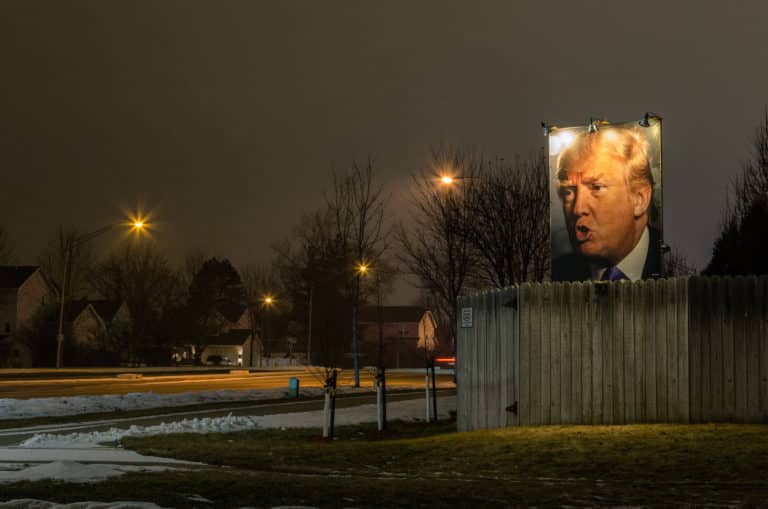
A photograph of 2016 presidential candidate Donald J. Trump lit up with flood lights in a suburban backyard near Jordan Creek Parkway and Cody Drive in West Des Moines, Iowa. Image by Tony Webster/Flickr, Some Rights Reserved.
Will Fascism Trump Democracy?
“We must love one another or die.”
—W.H. Auden
On January 27, 1838, Abraham Lincoln spoke to the Young Men’s Lyceum of Springfield, Illinois on the dangers facing American democracy. Lincoln was only 28, so it’s unlikely that many in his audience had him pegged as a prophet. But 23 years later, when the Civil War began, his words proved as prophetic as I believe they are today:
“At what point shall we expect the approach of danger? … Shall we expect some transatlantic military giant, to step the Ocean, and crush us at a blow? Never! All the armies of Europe, Asia and Africa combined… could not by force, take a drink from the Ohio, or make a track on the Blue Ridge, in a Trial of a thousand years.
At what point then is the approach of danger to be expected? I answer, if it ever reach us, it must spring up amongst us. It cannot come from abroad. If destruction be our lot, we must ourselves be its author and finisher. As a nation of freemen, we must live through all time, or die by suicide.
Lincoln did not anticipate the global reach of nuclear warfare, but his point remains sound. If American democracy fails, the ultimate cause will not be a foreign invasion. It will happen because “We the People” become so fearful of each other, of the economic, cultural, and security threats we believe to be posed by “the other” — and so dubious about finding a way forward while remaining true to democracy’s values — that we empower a fascist “strong man” who promises to make us “great” again. This is one way for a democracy to “die by suicide,” an act we seem to be contemplating at this very moment.
I don’t speak of “fascism” lightly. One of democracy’s values is open, honest, and civil conversation across lines of political conflict. Calling something or someone “fascist” sounds uncivil, to say the least, and tends to be a conversation-stopper.
And yet there are times when no other word will do to name a political phenomenon that can be rationally defined and factually identified, and must be stopped in its tracks. The ultimate conversation-stopper is not the word “fascism” but fascism itself, which aims at shutting down the dialogue of differences that characterizes democracy at its creative best.
Full disclosure: I’m a Democrat, but I’m not a fan of indiscriminate Republican-bashing. My father was a staunch Republican and the best man I’ve ever known in both his public, business, and personal life. A Republican president, Abraham Lincoln, started me down the political trail I’m still tracking. Can Republican political convictions and democratic values go hand-in-hand? Of course they can. The fascist threat we face today has a base that reaches across party lines.

That base is aroused when would-be leaders appeal to those fearful, angry, and resentful parts in us — in all of us — that yearn for an authoritarian “fix” for our problems and a “strong man” to administer it. Lest we forget the hard-won lessons of bloody history, here are three traits of a fascist leader in the making:
One. The leader of a fascist movement doesn’t need a realistic plan to solve anyone’s problems. All he needs is scapegoats, and a promise to eliminate them. If he can convince enough fear-ridden people that their safety, jobs, and most cherished values will be preserved as soon as he rids our land of, say, Mexicans and Muslims, his movement to power is underway, no matter how false his assignment of blame may be.
Such a leader will behave in ways that make him look like the “strong man” his followers need to compensate for their own sense of impotence — and the more odious his persona, the stronger he seems to them: “See how he insults the powerful right to their faces!” “See how he feels free to say whatever is on his mind, no matter how crude!” He might even boast indirectly of his own sexual prowess. Ironically, this will win him support even among folks who bewail the loss of “Christian family values,” and still somehow believe that public vulgarity reveals the kind of strength required to bring them back.
Two. The leader of a fascist movement has a simple approach to dealing with critics: he kills them off, either literally or metaphorically. I don’t need to explain what “literal” means: hundreds of thousands of Hitler’s critics as well as millions of Jewish scapegoats were murdered in the Holocaust. But that’s not the only way to get the killing done. A fascist leader is skilled at the kind of labeling and name-calling that kills critics off with words. He employs verbal violence to render his critics irrelevant, a legal and effective way of doing them in.
If he gets a big enough megaphone — easily obtained from media outlets that traffic in sensationalism — and hurls his insults often enough, his political opponents will soon be known as “whiny babies,” “pathetic losers,” or people so “ugly” that “you don’t want a president with a face like that.” A fascist leader silences his critics, grows his base, and accelerates his quest for control with the same tools the fifth-grade bully uses to make kids afraid to cross him.
Three. The leader of a fascist movement knows how to turn “We the People” into a circular firing squad, setting us against one another in a way that robs us of collective power. There is irony upon irony in a fascist leader’s rise to power, but this may be the greatest irony of all: people’s sense of powerlessness leads them to empower a leader who makes them even more powerless.
Fascism’s divide-and-conquer tactics, if we succumb to them, deprive us of the kind of civil conversations on which democracy thrives — conversations that allow us to reach a rough consensus on at least a few elements of the common good and hold our leaders accountable to it. When people-power is defused, a political vacuum is created in which fascism can move uninhibited, unchecked, and unhinged.
Of course, the leader of a fascist movement would get nowhere if he could not attract followers who believe that he can meet their needs. And there’s the rub. Fascism is hard to fight because, at bottom, its support comes more from a psychological and spiritual pathology than a political ideology. Leaders of fascist movements appeal to the “authoritarian personality” that’s been a subject of serious study since World War II.
That fact takes us down a rabbit hole that’s beyond the scope of this essay, as one example will reveal. Behind his arrogance, the fascist leader is a tightly-wound bundle of deep-seated insecurities. This should be a turn-off to an insecure populace. Yet, in the twisted authoritarian psyche, masked insecurity attracts adherents. The leader who is so insecure that he must compensate with braggadocio about everything he has or has done gives his followers a way to translate their own insecurities into what passes for strength. A mob is no more than insecurity shouting to cover up its fears, which is what makes it so dangerous.
Will fascism trump democracy in America? It depends on “We the People,” on our honesty about our own dark fears, our capacity to call out fascism when it arises among us, our courage to speak up against it, and our willingness to join the resistance.
It also depends on, at least, modest regard for facts. In the 15 years since 9/11, 45 people in the U.S. have been killed in violent jihadist attacks, while 48 have been killed in home-grown, far right wing attacks, often by white supremacists and nominal Christians. All of these deaths are tragic, of course. But why are so many of “We the People” lining up behind a leader who pledges death to jihadists — and their families — while playing footsie with white supremacists who are measurably more deadly here at home?
I’ll give the final word to W.H. Auden, with the last two stanzas of his poem, “September 1, 1939.” That’s the date on which Germany invaded Poland, launching a war fueled by a fascism more virulent than most Americans imagined possible, and some continue to deny to this day. Lest we forget,
All I have is a voice
To undo the folded lie,
The romantic lie in the brain
Of the sensual man-in-the-street
And the lie of Authority
Whose buildings grope the sky:
There is no such thing as the State
And no one exists alone;
Hunger allows no choice
To the citizen or the police;
We must love one another or die.Defenceless under the night
Our world in stupor lies;
Yet, dotted everywhere,
Ironic points of light
Flash out wherever the Just
Exchange their messages:
May I, composed like them
Of Eros and of dust,
Beleaguered by the same
Negation and despair,
Show an affirming flame.


